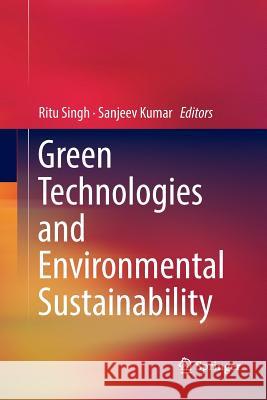Green Technologies and Environmental Sustainability » książka



Green Technologies and Environmental Sustainability
ISBN-13: 9783319844541 / Angielski / Miękka / 2018 / 492 str.
Green Technologies and Environmental Sustainability
ISBN-13: 9783319844541 / Angielski / Miękka / 2018 / 492 str.
(netto: 766,76 VAT: 5%)
Najniższa cena z 30 dni: 771,08
ok. 22 dni roboczych.
Darmowa dostawa!
"This book also highlights the recent advancements made towards sustainable development in the field of bioenergy, nanotechnology, green chemistry, bioremediation and degraded land reclamation and helps bridge the gap between the scientific community and policymakers. ... This book will be useful for graduate, postgraduate students, scientists, college and university professors, research professionals, technology investors and developers, research enterprises, research laboratories and academic and research libraries." (Pankaj Chowdhary and Ram Naresh Bharagava, Environment, Development and Sustainability, Vol. 22, 2020)
Chapter 1. A review and perspective of constructed wetlands as a green technology in decentralization practices.- Chapter 2. Laccases: A Blue Enzyme for Greener Alternative Technologies in the Detection and Treatment of Emerging Pollutants.- Chapter 3. Biofuels for Sustainable Development-A Global Perspective.- Chapter 4. Greening the Indian Transport Sector: Role of biodiesel.- Chapter 5. Microalgae biofuels: A green renewable resource to fuel the future.- Chapter 6. Harvesting of Microalgae for Biofuels: comprehensive performance evaluation of natural, inorganic and synthetic flocculants.- Chapter 7. Solar Energy Harvesting Solar photovoltaics (PV): A sustainable solution to solve energy crisis.- Chapter 8. Biological limitations on Glyphosate Biodegradation.- Chapter 9. Bioindication-based approaches for sustainable management of urban ecosystems.- Chapter 10. An Overview of Sustainable Dimensions and Indicators for Smart City.- Chapter 11. Need for an integrated approach towards environmental quality control in developing countries.- Chapter 12. Eco-friendly Post-consumer waste management utilizing Vermi-technology.- Chapter 13. Recent Advancement in Green Sustainable Nanocellulosic Fiber: An overview.- Chapter 14. Metal NPs (Au, Ag & Cu): Synthesis, stabilization & their role in green chemistry and drug delivery.- Chapter 15. Green Synthesis of Nanoparticles: An Emerging Phyotechnology.- Chapter 16. Green analytical techniques- Novel and Aboriginal perspectives on Sustainable Development.- Chapter 17. Emerging aspects of bioremediation of arsenic.- Chapter 18. Distillery wastewater: A major source of environmental pollution and it’s biological treatment for environmental safety.- Chapter 19. Ecological Restoration techniques for management of degraded, mined-out areas and the role played by rhizospheric microbial flora-A review of case studies from India.- Chapter 20. Biochar: An Emerging Panacea for Contaminated and Degraded Soil.
Dr. Ritu Singh is an Assistant Professor in Department of Environmental Science, School of Earth Sciences, Central University of Rajasthan, Rajasthan, India and editor of ‘Journal of Nanoscience, Nanoengineering and Applications’ & ‘Journal of Water Pollution & Purification Research’. She received her doctorate degree in Environmental Science from Babasaheb Bhimrao Ambedkar University, Lucknow. She has worked as research fellow in CSIR-Indian Institute of Toxicology Research and made significant contribution in the field of nano-remediation. She has published her work in several international journals of repute and has contributed several chapters in international and national books. She is the recipient of ‘DEF-Young Scientist Award’ in the field of Environmental Science. She is serving as life member of various academic bodies. Her research interest includes integrated nanotechnologies, wastewater treatment, environmental monitoring and assessment, analytical method development and microextraction techniques.
Dr. Sanjeev Kumar is working as Assistant Professor in School for Environmental Science, Babasaheb Bhimrao Ambedkar University, Lucknow, Joint Secretary in Prof. H.S. Srivastava foundation for Science and Society, Joint Secretary in The Society for Science of Climate Change and Sustainable Environment and as Co-Editor in a multilingual magazine ‘KAHAAR’. Dr. Sanjeev Kumar has also worked as Assistant Editor in International Journal of Functional Plant Biology, ‘Physiology and Molecular Biology of Plants and Journal of Climate Change and Environmental Sustainability. He received his Ph.D. degree in Environmental Sciences from Babasaheb Bhimrao Ambedkar University, Lucknow. He has published several research articles in national and international journals and has several book chapters in national and international books to his credit. He has been awarded with “Fellow of Society of Plant Research” and has also got recognition award of “Significant contribution in academic activities” by Babasaheb Bhimrao Ambedkar Univerity, Lucknow.
In the present scenario, green technologies are playing significant role in changing the course of nation’s economic growth towards sustainability and providing an alternative socio-economic model that will enable present and future generations to live in a clean and healthy environment, in harmony with nature. Green technology, which is also known as clean technology, refers to the development and extension of processes, practices, and applications that improve or replace the existing technologies facilitating society to meet their own needs while substantially decreasing the impact of human on the planet, and reducing environmental risks and ecological scarcities. The concepts of Green Technologies, if endorsed and pervaded into the lives of all societies, will facilitate the aim of the Millennium Development Goals of keeping the environment intact and improve it for the civilization to survive. Green Technologies and Environmental Sustainability is focused on the goals of green technologies which are becoming increasingly important for ensuring sustainability. This book provides different perspectives of green technology in sectors like energy, agriculture, waste management and economics and contains recent advancements made towards sustainable development in the field of bioenergy, nanotechnology, green chemistry, bioremediation, degraded land reclamation.
This book is written for a large and broad readership, including researchers, scientists, academicians and readers from diverse backgrounds across various fields such as nanotechnology, chemistry, agriculture, environmental science, water engineering, waste management and energy. It could also serve as a reference book for graduates and post-graduate students, faculties, environmentalist and industrial personnel who are working in the area of green technologies.
1997-2026 DolnySlask.com Agencja Internetowa
KrainaKsiazek.PL - Księgarnia Internetowa









